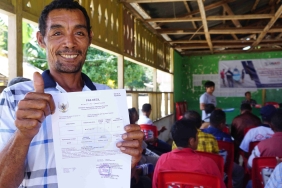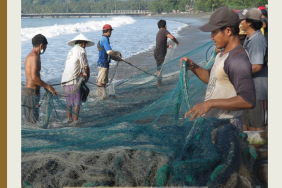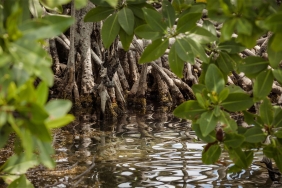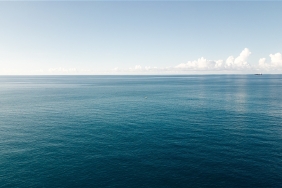IMPLEMENTATION OF AIP FOR TRADITIONAL TIGER SHRIMP FARMING IN KALTARA
By Agis Riyani and Mohammad Budi Santosa
WWF-Indonesia conducted a training on Better Management Practices (BMP) of Wind Shrimp Aquaculture for farmers and fisheries extension officers from districts/cities in North Kalimantan Province (Kaltara) on December 15-17, 2014. No less than 30 farmers and 8 fisheries extension workers from the Marine and Fisheries Service of Bulungan Regency, Tarakan City, and Tana Tidung Regency attended the event.
The Head of the Aquaculture and Capture Fisheries Division of the Tarakan City Marine and Fisheries Service, Ir. Nurmayanti, M.Si, who was also present in his remarks, reminded the farmers to practice responsible cultivation in accordance with the Good Fish Cultivation Practices (CBIB) and BMPs. This is done to maintain the quality and competitiveness of traditionally farmed tiger shrimp products from North Kalimantan in the domestic and international markets.
Acting as resource persons for the training were Wahju Subachri (WWF-Indonesia Senior Fisheries Officer), along with Dini Yuntiahadi and Yeni Sugiati who are Fisheries Field Extension Officers of Tarakan City. The training method used consisted of two parts, namely the provision of tiger shrimp farming BMP material and hands-on practice at the shrimp farming pond site.
Positive feedback was received from farmers at the end of the BMP training. They were eager to implement the BMPs and conduct water quality tests directly on their ponds. This is also in line with the Aquaculture Improvement Program (AIP) that is also being conducted by PT Mustika Minanusa Aurora (PT MMA), one of the candidate members of the Seafood Savers Program in Tarakan City, North Kalimantan.
As part of the follow-up to the signing of the Seafood Savers Pre-member Memorandum of Understanding, PT. MMA has carried out five activities that are part of the minimum improvement requirements, namely 1) socialization of the prohibition of the use of hazardous and prohibited chemicals, 2) mangrove rehabilitation in the pond area, 3) provision of quality fingerlings, 4) conducting a Participatory Social Impact Assessment (PSIA), and 5) creating product traceability standards at the location of PT. MMA's supplier ponds. These suppliers are spread across Bulungan Regency, namely in the areas of Tias Island, Mangkudulis Kecil Island, Sungai Bara, Tanjung Tiram, Tibi Island, Pas Payau, and Betayau Island.
The AIP conducted by PT MMA together with WWF-Indonesia has now entered the survey and gap assessment stage in 22 ponds registered with the Seafood Savers Program. This is done to determine the gap between the Aquaculture Stewardship Council (ASC) standards for shrimp commodities and the current conditions on the ground. The results of the gap analysis will be finalized by the end of December 2014 and will be followed by the development of an aquaculture improvement work plan, also known as the AIP work plan.
The AIP and BMP training are expected to provide more opportunities for traditional tiger shrimp farmers in the region to increase production and market competitiveness. In addition, farmers can also maintain the balance of the ecosystem which leads to increased welfare.





